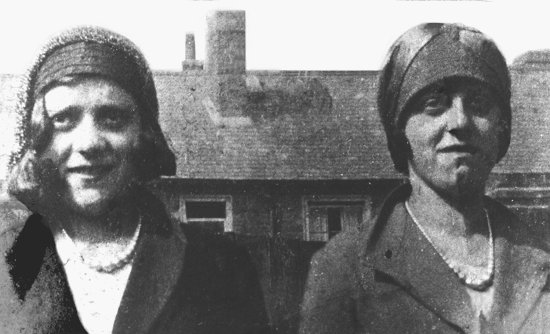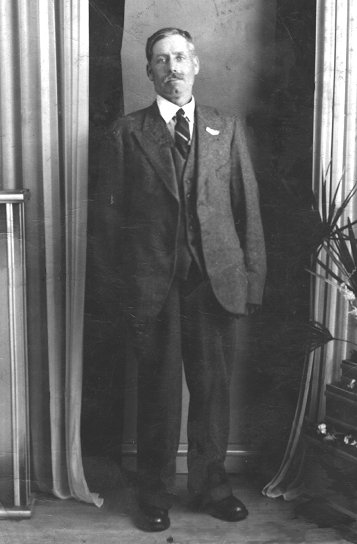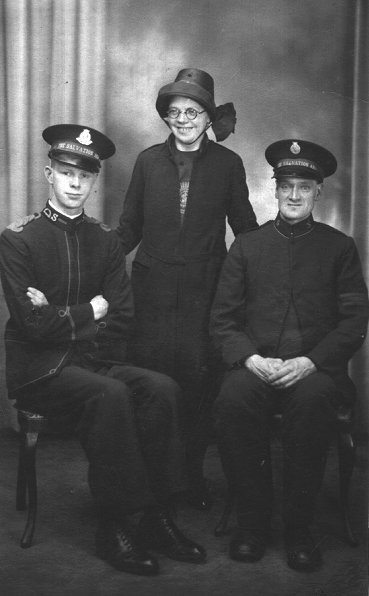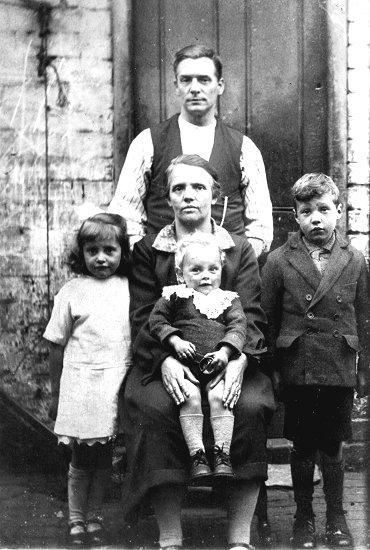|
More Children Sarah and Henry Flavell in
Back 10 had 10 children:
May, Clara (died at the age of 14
months), Daisy, Bill, Rose, Jack, Harry, George, Mary,
and Norman.
Although life was hard, with money in short
supply, the family had happy memories of their time in
Back 10. As the family increased in size, so did the
amount of work that Sarah had to do. Daisy helped with
the housework by cleaning the house, washing the
clothes, looking after the children, and running
errands. |
|

Daisy and May Flavell in the old
yard. |
She went to Dorset Road School,
which was situated on part of the present Woods Bank
housing estate.
Daisy enjoyed School and had many friends. At
lunchtime she would take lunches to friends and
relatives from the old yard who worked locally. The
money collected from this was given to her mother, as
every little helped. Each Sunday she went to the
service at St George's Church on Darlaston Green, where
she was confirmed. |
|
There was a wonderful community
spirit among the people who lived in the old yard. A
good example happened on every bonfire night when a
large bonfire would be built, and roast chestnuts and
potatoes were in plentiful supply. Everyone joined in
the festivities.
Bill and Daisy Whitehouse's family
at number 8 increased in size. They had three children;
Bill, George, and Gladys, and from an early age a
lifetime's friendship began for cousins Bill Whitehouse
and Harry Flavell, who were always the best of friends.
Daisy Flavell used to take all of her little brothers,
sisters, and Bill Whitehouse to Bilston each year for
the Easter Fair, which was held in the market hall. She
always bought toys for everyone and took a lot of care
of them. On the way they would stop outside St. Mary’s
Church in Oxford Street for a drink from the fountain.
They also used to go to the funfair, or the circus that was
occasionally held on the "Wake Field" where Pinfold
Street School playing fields are today. There used to be
a bakery at Catherine’s Cross, and each day the whole
area would fill with the delicious smell of freshly
baked bread.
Daisy sometimes recalled one visit to the
circus that was out of the ordinary. The elephants could
no longer resist the tempting smells from the bakery and
escaped. They soon covered the one hundred and fifty
yards or so to Catherine’s Cross and helped themselves
to all of the freshly baked bread in the shop. |

Henry Flavell in his best suit. |
|

Fanny Harris and two of her
Salvation Army colleagues. On the left is Charles
Fletcher, and on the right, Albert Bayley. |
Every Sunday the children had to go
to the service at the Salvation Army, probably due to
their Aunt Fanny's influence. On each visit they were
all given a card which was stamped with a blue cross.
When they arrived home the cards were inspected to see
if they had been stamped, if anyone's card hadn't been
stamped they were in for a lot of trouble.
The children
all followed in Daisy's footsteps by delivering
breakfasts and dinners to relatives at work, and also
had to deliver copies of "The War Cry" for their Aunt
Fanny.
Some of the children occasionally
helped at Andrew's Farm which was owned by Mary and Jim
Andrews who had a wheat field near the canal and a herd
of cows. The farm stood near the western side of what is
now Darlaston Community Science College in Herberts Park
Road.
Jack and Harry Flavell, and Bill
Whitehouse worked there while still at school. Jack took
the cows to be milked, and helped at harvest time. He
was always known as "sonny" to Mr. Andrews. Both Jack
and Bill used to operate the cream making machine, and a
mango cutter which cut mangos into strips for cattle
feed.
Bill Whitehouse once worked for a
whole week cutting mangos while on holiday. He operated
the machine for several hours each day, and was only
paid 3d for the whole weeks work. He realised that he
had been exploited and never went back. Mary Andrews
delivered the milk to people's homes in a churn which
would be considered very unhygienic by today's
standards.
|
| Cricket matches were played by the side of Andrew's
Farm, the score numbers being put on the side of the
farmhouse. The children used to watch these matches
which were very popular. Football was another popular
game to play, but footballs were expensive. A couple of
doors down from number 8 stood Spittle's shop. They
bought pigs for slaughter and afterwards sold the meat.
The pigs were killed at the back of the shop, and their
screams rang out each time one was killed. Mr. Spittle
gave Harry Flavell and Bill
Whitehouse the pig's bladders which were tied, and
blown-up for use as footballs. Bill Flavell kept pigeons and
chickens. He used to buy eggs which were then only a
halfpenny each from George and Lillian Perrins' shop to
put under his pigeons. Bill's uncle, George Whitehouse
also kept pigeons.
The men in the Old Yard played
marbles, and drank in the two pubs in Forge Road. The
New Junction was known as Aston's after the family who
owned and ran it, similarly Herberts Park Tavern used to
be called Nancy's.
Henry and Sarah occasionally drank in
the Bulls Head in Cock Street. It had a yard where
children could play and so they sometimes took young
Daisy along with them. They would also take the children
out for a walk on sunny weekends, often to Bentley,
which was still open countryside with corn and cabbage
fields. Harry Flavell and Bill Whitehouse sometimes
walked to Penn Common on their days out. |

The Whitehouse family behind
number 8. |
|
When gas was installed at number 8
a gas meter was fitted in the cellar. It included a gas
trap which had to be frequently topped-up with water.
The water would evaporate resulting in a smell of gas
throughout the house. It became Bill Whitehouse's job to
top-up the trap with water. Failure to do so would have
been very dangerous.
|
 |
|
 |
|
 |
Return to
Families |
|
Return to
the contents |
|
Proceed to
Later Years |
|